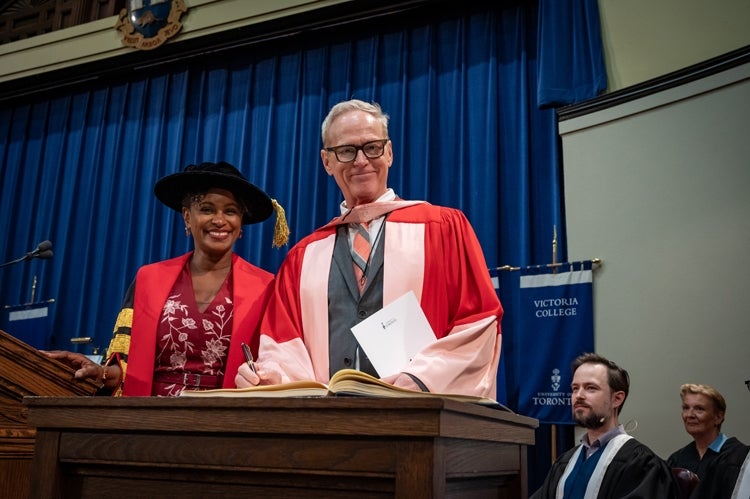Alan Taylor, acclaimed director of TV and film, receives U of T honorary degree
(photo by Lisa Sakulensky)
Published: June 12, 2025
Before he became the go-to director for some of television's most unforgettable moments – such as Caesar’s assassination in Rome or Ned Stark’s beheading in Game of Thrones – Alan Taylor was a student at the University of Toronto, where he studied history and philosophy.
Today, the award-winning filmmaker returns to U of T to receive a Doctor of Laws, honoris causa, in recognition of his extraordinary contributions to television and film, and for his enduring impact on the arts and entertainment industry.
Born in Ann Arbor, Michigan, in 1959, Taylor spent much of his childhood in Ottawa. He first encountered the performing arts in high school, acting in a production of The Mouse That Roared. He went on to study at U of T, earning a bachelor of arts degree from Victoria College in 1981.
Taylor went on to pursue a master’s degree in historical studies at Columbia University and later entered the film program at New York University’s Tisch School of the Arts, where famed director Martin Scorsese was an instructor.
At NYU, he excelled, winning a Mobil film competition for his thesis project, That Burning Question. The success of the short led to a flurry of offers. Yet, while he aspired to follow in the footsteps of his indie film idols, including Jim Jarmusch and Martin Scorsese, he initially embarked in a different direction. His thesis film had caught the attention of Tom Fontana, then the showrunner for Homicide: Life on the Street. Fontana offered Taylor, a newcomer, a directing slot on the NBC police drama.
The opportunity was daunting. “I’d done nothing but make my little movies with my friends up to that point, and this was my first professional experience,” Taylor told the Directors Guild.
The show’s realistic style, using handheld cameras, was unusual at the time. Homicide directors were instructed to watch Jean-Luc Godard’s film Breathless to learn “all the things you never do in TV.”

In the early 1990s, he directed his first feature, Palookaville. The gangster comedy, produced on a shoestring budget, won Best First Feature at the Venice Film Festival but underperformed at the box office, causing Taylor some angst. “When you direct a movie that makes no money whatsoever, there is no rush to your door for the next one.”
Despite the film’s commercial shortcomings, it caught the eye of producer David Chase, who offered Taylor a directing role on his new show, The Sopranos. Taylor went on to helm nine episodes of the groundbreaking HBO drama and won a Primetime Emmy Award for the episode “Kennedy and Heidi,” in which Tony Soprano kills his nephew, Christopher.
Taylor described the show as his “training ground” for working with actors, and it launched a long and successful association with HBO. He went on to direct episodes of many of the network’s most critically acclaimed series, including Six Feet Under, Sex and the City, Deadwood, Rome, Boardwalk Empire and Game of Thrones.
For directing the episode of Rome featuring the demise of Caesar, and the beheading of Ned Stark in Game of Thrones, Taylor gained a reputation as HBO’s “executioner for hire” – the director who gets the “big death” episodes. He also oversaw a few notable births, including the Mad Men pilot, and the dragon mother episode in Game of Thrones.
Big Hollywood studios soon came calling. In 2012, he was lured away from HBO to direct Thor: The Dark World. Two years later, Taylor took on Terminator: Genisys. While the movie was profitable, it drew harsh criticism from fans and critics. “I lost the will to make movies,” Taylor told The Hollywood Reporter. “I came out of it having to rediscover the joy of filmmaking.”
In recent years, Taylor has returned to the work that first inspired him: thoughtful, character-driven stories. He reunited with The Sopranos creator David Chase to direct The Many Saints of Newark, a prequel to the groundbreaking series that helped launch him into the spotlight.



